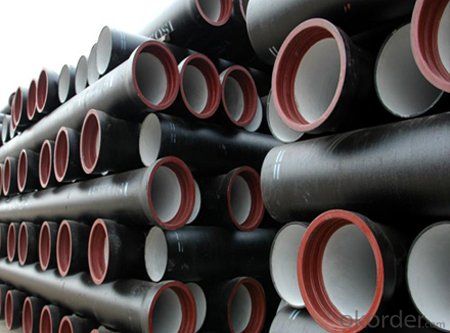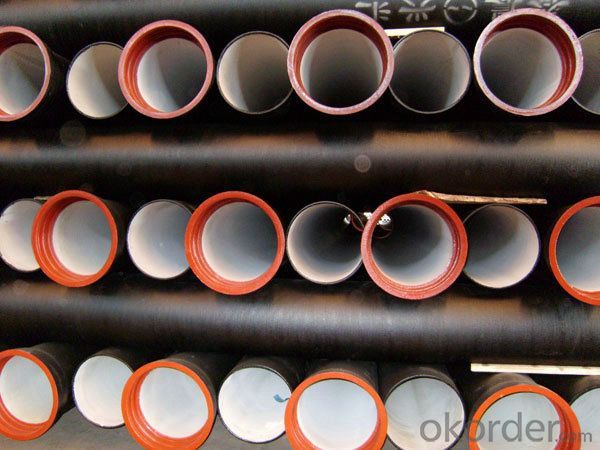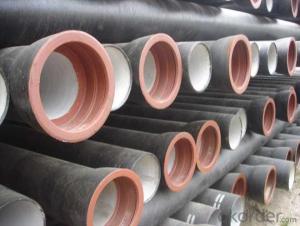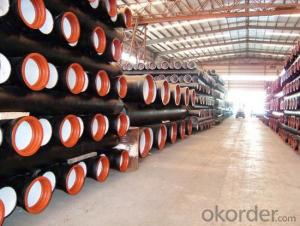Ductile Iron Pipe of China DN900 EN598 On Sale
- Loading Port:
- China main port
- Payment Terms:
- TT or LC
- Min Order Qty:
- 20 m.t.
- Supply Capability:
- 100000 m.t./month
OKorder Service Pledge
OKorder Financial Service
You Might Also Like
1,Ductile Iron Pipe Description :
1) Pipes confirm to ISO2531,K9 class,T type joint,6m long,with inside cements lining conform to ISO4179, outside Zinc spraying(130g/m2) and bitumen coating(70μm) conform to ISO8179.
2) Pipe ends: Spigot and socket ends, with 100% SBR rubber gaskets accoding to ISO4633
3) we can do third party inspection according to customer's request.
2,Main Features of the Ductile Iron Pipe:
•High yield strength
•High tensile Strength
•High corrosion resistance
•Pressure Resistence
•Satisfy the highest hygienic standards
3,Ductile Iron Pipe Images:


4. Ductile Iron Pipe Specification:
Surface Finishes: Bare, Oiled, Mill Varnish, Galv,FBE, FBE Dual, 3LPE, 3LPP, Coal Tar,Concrete Coating and Tape Wrap
End Finishes: Beveled, Square Cut, Threaded, hat
Additional Services: Internal Coating
Packaging: packed in bag, plastic bag, steel strip, steel wire,double wire, iron box, wooden box, tarpaulin, plastic sheeting
Test: X-ray, UT, magnetic particle,inspection,hydrostatic test.
Processing service: Beveling, Threading, Slotting, Cut-to length, Bends, Quench and Temper, Fabrication, Double-jointing and On-site assistance
5.FAQ:
We have organized several common questions for our clients,may help you sincerely:
1.Q: Why would you choose ductile iron pipe rather than other pipe materials?
A:The reasons are obvious for that not only ductile iron pipe possesses the inherent strength and flexibility of ductile iron, combined with proven corrosion protection systems, but also the cost savings can be achieved from design to installation and commissioning.
2.Q:Why can you guarantee the inner of pipes can’t be corroded?
A: High alumina cement mortar lining and sulphate-resistant cement mortar lining. These two special linings are applicable to inner anti-corrosion for sewage pipes, improving resistance to erosion of the sewage components.
- Q:Are ductile iron pipes suitable for road crossings?
- Yes, ductile iron pipes are suitable for road crossings. Ductile iron is a strong and durable material that can withstand heavy loads and traffic. It has high tensile strength and flexibility, making it an ideal choice for underground installations beneath roads. Additionally, ductile iron pipes are resistant to corrosion and have a long lifespan, making them a reliable option for road crossings.
- Q:Disadvantages of ductile iron pipes
- Compared with cast iron, ductile iron has an absolute advantage in strength. The tensile strength of ductile iron is 60K, while the tensile strength of cast iron is only 31k. The yield strength of ductile iron is 40K, while the cast iron does not show yield strength, and eventually breaks. The strength to cost ratio of ductile iron is far superior to that of cast iron.
- Q:Method for cutting cast iron pipe
- I don't know the diameter and length of the cast iron tube. The small diameter can be made of a huge bed. The short one can also be lathe. The lathe is very flat
- Q:Can ductile iron pipes be used for stormwater drainage systems?
- Indeed, stormwater drainage systems can utilize ductile iron pipes. These pipes are renowned for their strength, durability, and resistance to corrosion, rendering them appropriate for various applications, including stormwater drainage. They possess the capacity to accommodate substantial water flow and endure heavy traffic loads, making them a reliable selection for stormwater management. Moreover, ductile iron pipes exhibit exceptional joint performance, guaranteeing a watertight and secure connection, a critical aspect in preventing leaks and preserving the integrity of the stormwater drainage system. All in all, due to their sturdiness, longevity, and ability to withstand the challenging conditions typically associated with stormwater management, ductile iron pipes present a viable choice for stormwater drainage systems.
- Q:Are there any special coatings or linings used for ductile iron pipes?
- Yes, there are special coatings and linings used for ductile iron pipes. These coatings are applied to the interior and exterior surfaces of the pipes to protect them from corrosion and extend their lifespan. Common coatings include cement mortar lining, epoxy lining, and polyethylene encasement. These protective layers help prevent the formation of rust and scale, ensuring the durability and longevity of ductile iron pipes.
- Q:What do ductile iron pipes need to connect with three? Can I contact it directly?
- Because the interface material used in the old process is poisonous, especially in the water supply pipeline, environmental protection requires a new process now
- Q:What are the different sizes available for ductile iron pipe?
- Ductile iron pipes are available in a wide range of sizes to cater to various applications in the water and wastewater industry. The sizes of ductile iron pipes typically range from 3 inches to 64 inches in diameter. The most commonly used sizes include 4 inches, 6 inches, 8 inches, 10 inches, 12 inches, 16 inches, 20 inches, 24 inches, 30 inches, and 36 inches. However, ductile iron pipes can also be manufactured in larger sizes depending on specific project requirements. These different sizes allow for flexibility in designing and constructing water distribution systems, sewage networks, and other infrastructure projects. The selection of the appropriate size depends on factors such as the volume of flow, pressure requirements, and the distance the pipe needs to cover. It is worth mentioning that the size of a ductile iron pipe refers to its internal diameter, also known as the nominal bore. The actual outside diameter of the pipe may vary slightly depending on the manufacturer and the specific dimensions provided. When choosing a size for ductile iron pipes, it is essential to consider factors such as hydraulic capacity, installation requirements, and the compatibility with other pipeline components. Consulting with engineers and industry experts is advisable to ensure the correct size selection for each specific application.
- Q:Can ductile iron pipe be used for compressed air systems?
- Yes, ductile iron pipe can be used for compressed air systems. Ductile iron is known for its durability and high strength, making it suitable for handling the pressure requirements of compressed air systems. However, it is important to consider factors such as pipe sizing, pressure ratings, and compatibility with other system components to ensure safe and efficient operation.
- Q:Are there any specific standards or specifications for ductile iron pipes?
- Yes, there are specific standards and specifications for ductile iron pipes. The most commonly used standards for ductile iron pipes are set by the American Water Works Association (AWWA) and the International Organization for Standardization (ISO). The AWWA standard for ductile iron pipes is known as AWWA C151. This standard covers the design, manufacturing, testing, installation, and maintenance requirements for ductile iron pipes used in water and wastewater applications. It specifies the materials, dimensions, and mechanical properties of the pipes, as well as the required coatings and linings. Similarly, the ISO standard for ductile iron pipes is ISO 2531. This standard provides guidelines for the design, manufacturing, testing, and installation of ductile iron pipes for water and wastewater systems. It covers various aspects such as dimensions, mechanical properties, coatings, and linings. In addition to these two widely recognized standards, there may be other regional or national standards specific to certain countries or regions. These standards often align with the AWWA and ISO standards or may have additional requirements specific to local conditions or regulations. Compliance with these standards ensures that ductile iron pipes meet the necessary quality and performance requirements. It also facilitates the interoperability and compatibility of ductile iron pipes across different systems and countries, enabling reliable and efficient water distribution and wastewater management.
- Q:The difference between flexible joint cast iron pipe and flexible anti-seismic cast iron pipe
- Nodular cast iron pipes and fittings technical manual PDF download Fan Yingjun handsome date: Author: fan manufacturing technology, in January 2006, this book introduces the ductile iron pipe interface form, quality standard, installation technology and special use of ductile cast iron pipe and other content, lists all the technical parameters for ductile iron pipes, pipe fittings interface in order to facilitate the readers to use and accessories
1. Manufacturer Overview |
|
|---|---|
| Location | |
| Year Established | |
| Annual Output Value | |
| Main Markets | |
| Company Certifications | |
2. Manufacturer Certificates |
|
|---|---|
| a) Certification Name | |
| Range | |
| Reference | |
| Validity Period | |
3. Manufacturer Capability |
|
|---|---|
| a)Trade Capacity | |
| Nearest Port | |
| Export Percentage | |
| No.of Employees in Trade Department | |
| Language Spoken: | |
| b)Factory Information | |
| Factory Size: | |
| No. of Production Lines | |
| Contract Manufacturing | |
| Product Price Range | |
Send your message to us
Ductile Iron Pipe of China DN900 EN598 On Sale
- Loading Port:
- China main port
- Payment Terms:
- TT or LC
- Min Order Qty:
- 20 m.t.
- Supply Capability:
- 100000 m.t./month
OKorder Service Pledge
OKorder Financial Service
Similar products
New products
Hot products
Hot Searches
Related keywords



























